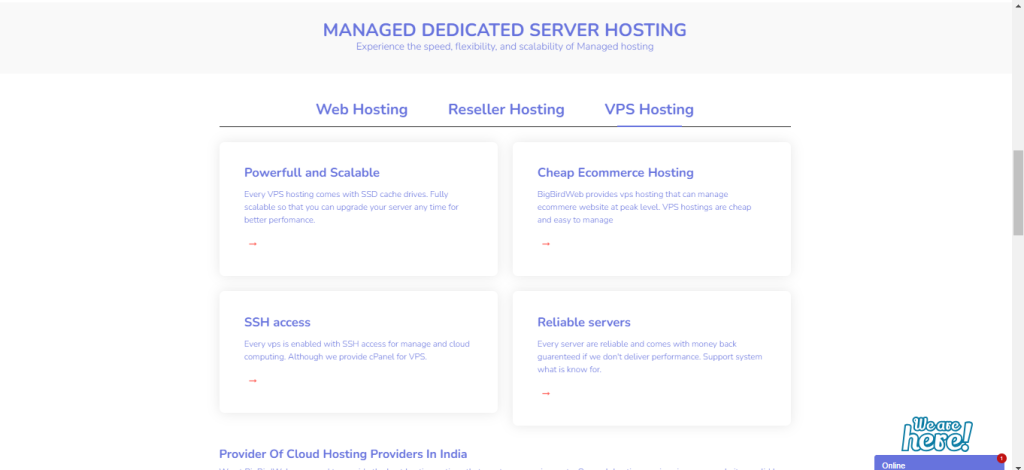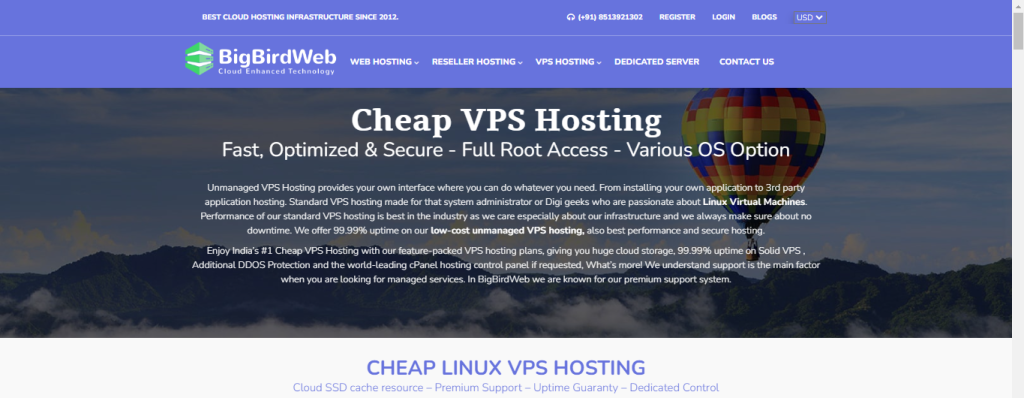The Future of Web Hosting is rapidly evolving, with Virtual Private Servers (VPS) hosting emerging as a leading choice for businesses and developers alike. As technology advances and online presence becomes increasingly vital, understanding the dynamics of web hosting and the reasons behind VPS’s prominence is essential. This blog delves into the future trends in web hosting, the benefits of VPS, and why it is poised to dominate the industry.

Table of Contents
Understanding Web Hosting
Web hosting is the backbone of the internet, providing the necessary infrastructure for websites to be accessible online. There are several types of web hosting, each catering to different needs:
- Shared Hosting: Multiple websites share a single server’s resources. It’s cost-effective but can suffer from performance issues due to resource sharing.
- Dedicated Hosting: A single website has an entire server to itself. It offers high performance but is expensive.
- Virtual Private Server (VPS) Hosting: A hybrid solution where a physical server is divided into multiple virtual servers, each acting independently. It balances cost and performance.
The Rise of VPS Hosting
As we look towards the Future of Web Hosting, VPS stands out for several reasons:
1. Performance and Reliability
Unlike shared hosting, where resources are divided among multiple websites, VPS ensures dedicated resources for each virtual server. This results in better performance and reliability. With Future of Web Hosting, websites can handle higher traffic loads without experiencing slowdowns, making it ideal for growing businesses and high-traffic websites.
2. Scalability
Future of Web Hosting offers unparalleled scalability. As your website grows, you can easily upgrade your resources without migrating to a new server. This flexibility is crucial for businesses expecting growth, as it allows them to scale up or down based on demand.
3. Cost-Effectiveness
While dedicated hosting can be prohibitively expensive for many businesses, VPS offers a cost-effective alternative. It provides many of the benefits of a dedicated server at a fraction of the cost, making it accessible to small and medium-sized businesses.
4. Enhanced Security
Security is a significant concern in the Future of Web Hosting. VPS hosting offers enhanced security features compared to shared hosting. Each VPS hosting solutions is isolated from others, reducing the risk of security breaches. Additionally, users have greater control over their security settings, enabling them to implement robust security measures.
5. Customization and Control
VPS hosting provides root access, giving users complete control over their virtual server. This level of control is invaluable for developers who need to configure their servers to meet specific requirements. Customization options allow for tailored solutions that enhance performance and functionality.
6. Technical Support
Many VPS hosting providers offer robust technical support, ensuring that users can resolve issues quickly and efficiently. This support is often more comprehensive than what is available with shared hosting, providing peace of mind for businesses relying on their websites for critical operations.
Emerging Trends in the Future of Web Hosting
The Future of Web Hosting is shaped by several emerging trends, many of which align with the strengths of VPS hosting:
1. Cloud Integration
The integration of cloud technology with Future of Web Hosting is a game-changer. VPS can easily leverage cloud resources, providing scalability and redundancy. This integration ensures high availability and resilience, key factors in the modern web hosting landscape.
2. Green Hosting
As sustainability becomes a priority, green hosting solutions are gaining traction. VPS hosting can contribute to this trend by optimizing resource usage and reducing energy consumption compared to traditional dedicated servers.
3. Edge Computing
Edge computing brings data processing closer to the data source, reducing latency and improving performance. VPS hosting can be integrated with edge computing solutions, providing faster load times and a better user experience.
4. Artificial Intelligence and Machine Learning
AI and ML are transforming Future of Web Hosting by enabling smarter resource management, predictive maintenance, and enhanced security measures. VPS hosting can utilize these technologies to optimize performance and offer advanced features.
5. Increased Focus on Security
With cyber threats on the rise, the future of web hosting will place a greater emphasis on security. VPS hosting, with its isolation and control, is well-positioned to meet these heightened security demands.
Why VPS is the Future of Web Hosting
Given these trends and advantages, it’s clear why VPS is leading the charge in the Future of Web Hosting:
- Balance of Cost and Performance: VPS offers an ideal balance, providing superior performance and customization without the high costs associated with dedicated hosting.
- Flexibility and Scalability: The ability to scale resources easily makes VPS the perfect solution for businesses with fluctuating demands.
- Enhanced Security: VPS hosting’s isolation and control mechanisms ensure robust security, addressing the increasing concern over cyber threats.
- Support for Emerging Technologies: VPS hosting is adaptable, making it suitable for integrating with cutting-edge technologies like AI, ML, and edge computing.
- Sustainability: As the world moves towards greener solutions, VPS hosting’s efficient resource usage supports sustainability efforts.
Practical Applications of VPS Hosting

To illustrate the practical benefits, let’s explore how different industries can leverage VPS hosting:
1. E-commerce
E-commerce websites require high performance and reliability to handle large volumes of traffic and transactions. Future of Web Hosting provides the necessary resources and security to ensure smooth operations and protect sensitive customer data.
2. Content Management
For websites relying on content management systems (CMS) like WordPress, VPS hosting offers the scalability and control needed to manage large volumes of content and traffic spikes.
3. Development and Testing
Developers need environments that can be tailored to specific requirements. VPS hosting allows for custom configurations, making it ideal for development, testing, and deployment of applications.
4. Education
Educational institutions and online learning platforms can benefit from the scalability and performance of VPS hosting, ensuring uninterrupted access to educational resources.
5. Healthcare
The healthcare industry, which handles sensitive patient data, requires robust security measures. VPS hosting provides the necessary isolation and control to safeguard this data.
The Future of Web Hosting is Here
As we look towards the Future of Web Hosting, it is evident that VPS is at the forefront. Its combination of performance, scalability, cost-effectiveness, security, and customization makes it the ideal choice for a wide range of applications. Businesses and developers seeking to stay ahead in the digital landscape should consider VPS hosting as a key component of their strategy.
FAQs
What is the Future of Web Hosting?
The Future of Web Hosting is marked by the adoption of advanced technologies like VPS hosting, cloud integration, edge computing, and AI/ML, along with a focus on security and sustainability.
Why is VPS hosting important in the Future of Web Hosting?
Future of Web Hosting and VPS hosting offers a balance of cost, performance, scalability, security, and customization, making it ideal for businesses and developers looking to future-proof their online presence.
How does VPS hosting enhance security?
VPS hosting enhances security by isolating each virtual server, reducing the risk of breaches, and allowing users to implement custom security measures.
What industries benefit most from VPS hosting?
Industries such as e-commerce, content management, development and testing, education, and healthcare benefit significantly from VPS hosting due to its performance, scalability, and security features.
Can VPS hosting support emerging technologies?
Yes, VPS hosting is adaptable and can integrate with emerging technologies like cloud computing, edge computing, AI, and ML, ensuring it remains relevant in the Future of Web Hosting.
Bonus Content: Tips for Choosing a VPS Hosting Provider
When selecting a VPS hosting provider, consider the following tips to ensure you choose the best option for your needs:
- Evaluate Performance: Look for providers that offer high-performance servers with SSD storage and ample RAM.
- Check Scalability Options: Ensure the provider allows easy upgrades and scalability to accommodate growth.
- Review Security Features: Look for robust security measures, including firewalls, DDoS protection, and regular backups.
- Assess Support: Choose a provider with excellent customer support available 24/7.
- Compare Costs: While cost shouldn’t be the only factor, ensure the provider offers competitive pricing for the features included. You can also opt for free web hosting.
- Read Reviews: Research customer reviews and testimonials to gauge the provider’s reputation and reliability.
In conclusion, the Future of Web Hosting is bright with VPS leading the way. By understanding its advantages and staying informed about emerging trends, businesses can make informed decisions that ensure their online success.
The Evolution of Web Hosting: A Journey to VPS

To truly appreciate why effective VPS hosting is set to dominate the Future of Web Hosting, it’s essential to understand the evolution of web hosting technologies and how they have addressed the changing needs of the internet.
Early Days of Web Hosting
In the early days of the internet, web hosting was a relatively straightforward affair. In Future of Web Hosting ,Websites were simple, with static HTML pages that required minimal resources. During this time, shared hosting emerged as a popular solution, allowing multiple websites to share the resources of a single server. This was cost-effective and easy to manage, making it ideal for the nascent stages of the web.
The Advent of Dynamic Websites
As the internet grew, so did the complexity of websites. The introduction of dynamic content, driven by databases and server-side scripting languages like PHP and ASP, placed greater demands on web hosting infrastructure. Shared hosting began to show its limitations, especially in terms of performance and security. Websites started to outgrow the resources allocated to them, leading to slow loading times and frequent downtimes.
Rise of Dedicated Hosting
To address these issues, dedicated hosting became more prominent. By allocating an entire server to a single website, dedicated hosting offered unparalleled performance and reliability. However, this solution came with a significant cost, making it inaccessible for many small to medium-sized businesses. Additionally, managing a dedicated server required a high level of technical expertise, further limiting its adoption.
Introduction of VPS Hosting
The introduction of Virtual Private Servers (VPS) marked a significant turning point in the Future of Web Hosting. VPS hosting bridged the gap between shared and dedicated hosting by offering a virtualized environment that mimicked a dedicated server within a shared infrastructure. This innovation provided many of the benefits of dedicated hosting—such as improved performance, enhanced security, and greater control—at a fraction of the cost.
Technical Advantages of VPS Hosting
Virtualization Technology
VPS hosting leverages virtualization technology to create isolated environments on a single physical server. This means each VPS operates independently, with its own dedicated resources, operating system, and software. This isolation ensures that the performance and security of one VPS are not affected by the activities of others on the same physical server.
Resource Allocation
One of the key advantages of VPS hosting is guaranteed resource allocation. Unlike shared hosting, where resources are dynamically allocated based on demand, VPS hosting provides a fixed amount of CPU, RAM, and disk space to each virtual server. This ensures consistent performance, even during traffic spikes, making VPS ideal for high-traffic websites and resource-intensive applications.
Root Access and Customization
Future of Web Hosting offers root access, allowing users to configure their server environment to their exact specifications. This level of control is invaluable for developers and businesses with unique hosting requirements. Users can install custom software, optimize server settings, and implement security measures tailored to their needs.
Enhanced Security Measures
Security is a paramount concern in the Future of Web Hosting. VPS hosting offers several security advantages over shared hosting. The isolation provided by virtualization ensures that security breaches in one VPS do not affect others. Additionally, users can implement advanced security protocols, such as firewalls, intrusion detection systems, and regular security audits, to protect their data and applications.
VPS Hosting in the Context of Modern Web Technologies
Integration with Cloud Services
The integration of VPS hosting with cloud services is a significant trend shaping the Future of Web Hosting. Cloud VPS combines the benefits of virtualization with the scalability and redundancy of cloud infrastructure. This hybrid approach ensures high availability, as resources can be dynamically allocated across multiple physical servers in the cloud. Additionally, cloud VPS offers geographic redundancy, reducing the risk of downtime due to localized failures.
Containerization and Microservices
Containerization technologies, such as Docker, are revolutionizing the way applications are deployed and managed. VPS hosting is well-suited for running containerized applications, providing an isolated environment that can host multiple containers. This allows for efficient resource utilization and simplifies the deployment of microservices architectures, where applications are broken down into smaller, independently deployable services.
DevOps and Automation
The adoption of DevOps practices is another trend influencing the Future of Web Hosting. VPS hosting provides the flexibility and control needed to implement continuous integration and continuous deployment (CI/CD) pipelines. Automation tools, such as Ansible and Puppet, can be used to manage VPS environments, ensuring consistent and repeatable configurations. This streamlines development workflows and reduces the risk of human error.
Edge Computing and Low Latency Applications
Edge computing is transforming how data is processed and delivered. By processing data closer to the source, edge computing reduces latency and improves performance for real-time applications. VPS hosting can be deployed at the edge, providing a localized environment for running low-latency applications such as IoT devices, gaming, and video streaming.
Real-World Use Cases of VPS Hosting
Small to Medium-Sized Businesses (SMBs)
SMBs often face the challenge of balancing cost with performance. VPS hosting offers an affordable solution that provides the necessary resources and control to support business growth. For example, an e-commerce store can benefit from the consistent performance and enhanced security of VPS hosting, ensuring a smooth shopping experience for customers.
SaaS Providers
Software-as-a-Service (SaaS) providers require a hosting solution that can support multi-tenant applications and scale with user demand. VPS hosting provides the isolation and customization needed to securely host multiple clients on a single server, while also offering the flexibility to scale resources as the user base grows.
Digital Agencies
Digital agencies managing multiple client websites can leverage VPS hosting to provide dedicated resources for each client. This ensures that one client’s website performance is not affected by the activities of others. Additionally, the customization options of VPS hosting allow agencies to tailor the hosting environment to meet specific client requirements.
Educational Institutions
Educational institutions hosting online learning platforms and digital resources need a reliable and scalable hosting solution. VPS hosting provides the performance and security needed to support large numbers of concurrent users, ensuring uninterrupted access to educational content.
Financial Services
The financial sector demands the highest levels of security and performance. VPS hosting offers the isolation and control required to host sensitive financial applications and data. Financial institutions can implement stringent security measures and ensure compliance with industry regulations.
Future-Proofing Your Online Presence with VPS Hosting
Scalability for Growth
As businesses grow, their hosting needs evolve. VPS hosting provides the scalability to accommodate increasing traffic and resource demands. By easily upgrading the resources allocated to your VPS, you can ensure that your website or application continues to perform optimally, even as user numbers grow.
Enhancing User Experience
User experience is a critical factor in the success of any online presence. Slow loading times and downtime can negatively impact user satisfaction and lead to lost revenue. VPS hosting offers the performance and reliability needed to deliver a seamless user experience, ensuring that visitors can access your website or application quickly and without interruption.
Mitigating Security Risks
Cybersecurity threats are constantly evolving, making it essential to have robust security measures in place. VPS hosting allows you to implement advanced security protocols and maintain control over your server environment. This helps mitigate the risk of security breaches and protects sensitive data from unauthorized access.
Leveraging Emerging Technologies
Staying ahead of technological trends is crucial for maintaining a competitive edge. VPS hosting is highly adaptable, allowing you to integrate emerging technologies such as AI, ML, and edge computing into your hosting environment. This ensures that your website or application remains at the forefront of innovation and can take advantage of new capabilities as they become available.
Cost-Effective Solution

While dedicated hosting can be cost-prohibitive for many businesses, VPS hosting offers a cost-effective alternative that does not compromise on performance or features. By providing dedicated resources at a fraction of the cost, VPS hosting allows businesses to allocate their budgets more efficiently and invest in other areas of growth.
Conclusion: Embracing the Future with VPS Hosting
The Future of Web Hosting is undoubtedly intertwined with the rise of VPS hosting. As businesses and developers seek to navigate the complexities of the digital landscape, VPS hosting offers a robust, flexible, and cost-effective solution that meets the demands of modern web applications. By understanding the advantages and staying informed about emerging trends, you can make strategic decisions that ensure your online presence is future-proofed and ready to thrive in an ever-evolving internet ecosystem.
Whether you are a small business looking to scale, a developer seeking customization, or an enterprise prioritizing security and performance, VPS hosting provides the ideal platform to support your goals. Embrace the future of web hosting with VPS, and unlock the full potential of your online presence.
Extended FAQs
How does VPS hosting differ from shared hosting?
VPS hosting differs from shared hosting in that it provides dedicated resources and an isolated environment for each virtual server. This results in better performance, enhanced security, and greater control compared to shared hosting, where multiple websites share the same server resources.
Is VPS hosting suitable for high-traffic websites?
Yes, VPS hosting is well-suited for high-traffic websites. It offers dedicated resources that ensure consistent performance, even during traffic spikes. Additionally, VPS hosting can be easily scaled to accommodate increasing traffic demands.
Can I run multiple websites on a single VPS?
Yes, you can run multiple websites on a single VPS. Each website can be configured within its own isolated environment, ensuring that the performance and security of one website do not affect others.
What are the main security features of VPS hosting?
VPS hosting offers several security features, including isolation from other virtual servers, root access for implementing custom security measures, firewalls, intrusion detection systems, and regular security audits. These features help protect your data and applications from cyber threats.
How does VPS hosting support scalability?
VPS hosting supports scalability by allowing you to easily upgrade the resources allocated to your virtual server. This means you can increase CPU, RAM, and storage as needed, without the need to migrate to a new server.
